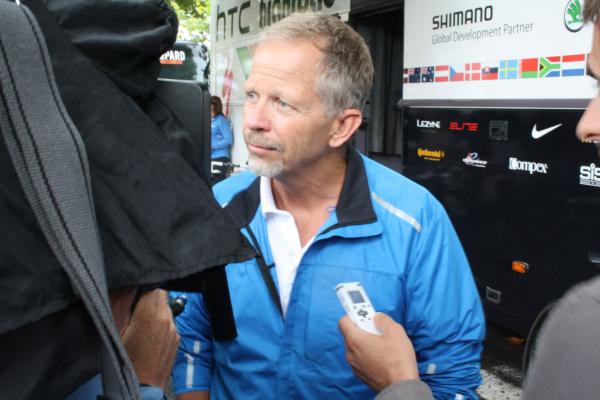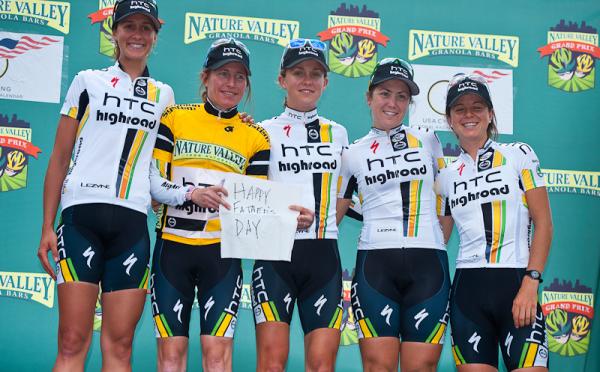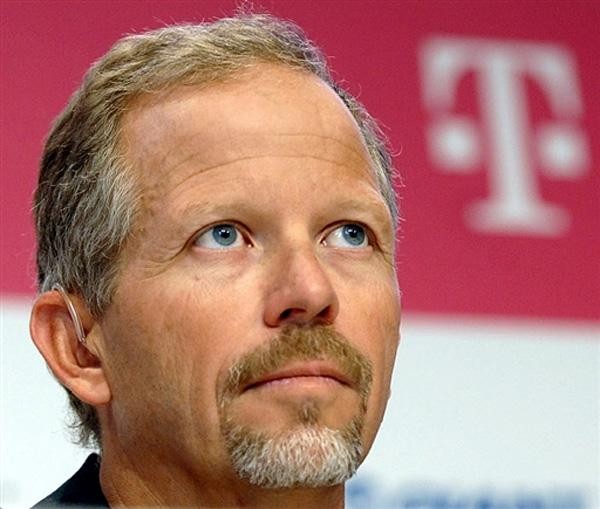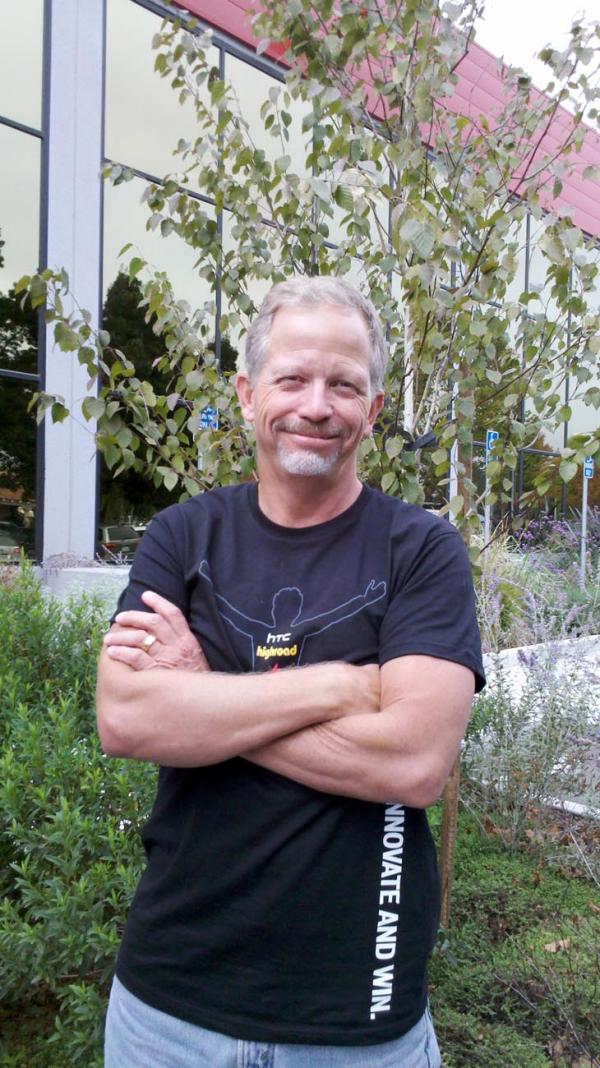HTC-Highroad disbands after failed sponsor search
Riders allowed to find new teams for 2012




The HTC-Highroad team will end its association with professional cycling at the end of the season, drawing to an end its five-year spell in the sport.
The squad has consistently been ranked as the number one team in the world, but struggled to attract a new sponsor or convince cell phone maker HTC to renew. Team owner Bob Stapleton today announced that the squad would fold at the end of the year, and encouraged riders from both the men's and women's teams to find new homes for 2012.
However, Stapleton held out hope that the women's team could continue.
Stapleton had pushed the search for a sponsor to the line, even going beyond the UCI’s transfer window opening on August 1st and although he had a sponsor lined up, the interested party pulled out of negotiations at the weekend.
“We went public with our sponsorship search just before the Tour. We were frustrated by the indecision of our title sponsor HTC who, after many months of assurances, had not come forward with a commitment to the team. That indecision remains a mystery to me,” Stapleton told the press in a phone conference.
Meanwhile, riders have already been in negotiations with other teams. Sprinter Mark Cavendish said he would announce his decision later this week, while the Velits twins, Martin and Peter, have already been announced as joining the QuickStep team, and Patrick Gretsch was confirmed with Skil-Shimano.
Down to the wire
The latest race content, interviews, features, reviews and expert buying guides, direct to your inbox!
The squad had one of its most successful Tours, with Cavendish winning the points classification and five stages, and Tony Martin claiming the stage victory in the Grenbole time trial, but at the same time Stapleton was honest about the uncertainty surrounding the team's future as he feverishly scrambled from meeting to meeting trying to close a deal.
Normally intensely private about negotiations, Stapleton's desperation became apparent as he used the publicity surrounding the Tour to vocally raise interest in the team's value by consistently reminding the media that the team had generated in the region of $400 million in media exposure during its tenure in the sport.
Meetings took place in Grenoble, Paris, Amsterdam, Chicago, Atlanta and New York with a number of international companies and the team was approached by several different squads to discuss the possibility of negotiating a tricky merger.
"We had an agreement in place in principle with a new partner which would have given us a enough funds to operate the team at the same level of the last four years. This deal abruptly collapsed on Sunday night, when I received an email and subsequent phone call from our intended partner."
Stapleton would not name the partner, nor disclose just how close or far they were to signing an agreement. Final talks with HTC broke down on Wednesday night, while hope of a possible last ditch merger failed Thursday morning.
"That led us to the conclusion to release our athletes and staff to pursue their career options," said an emotional Stapleton.
Bringing business to sport
Stapleton, a former CEO of the telecom company VoiceStream Wireless and member of the T-Mobile international board of directors, came into the sport as a unique force in team management. More businessman than cycling insider, Stapleton had made his name in the sport by supporting an American women's team before being elevated to manager of the T-Mobile men's team at the end of 2006.
He formed Highroad Sports in 2007, taking elements of the old Telekom team but inspiring a fresh more ethically correct and transparent ethos. T-Mobile signed on to support the team through 2010, but revelations surrounding the team's doping past, including links between Jan Ullrich and Operacion Puerto as well as the embarrasing testosterone positive of Patrik Sinkewitz during the 2007 Tour de France led the sponsor to withdraw that support at the end of the year.
Stapleton reportedly received a settlement of undisclosed value which kept the team going until Columbia Sportswear signed on as title sponsor before the 2008 Tour de France.
Since then, Stapleton has brought in HTC and built up the team not only to the top level in a sporting sense, but revitalised its image in terms of ethics.
Some of the sport's most successful and exciting talents passed through the team's doors: Edvald Boasson Hagen, Mark Renshaw and Mark Cavendish to name but a few, and between the men and women's teams, the squad secured an unequalled number of victories.
"What led to the team's remarkable success was the team's remarkable spirit that we had in the organisation. This year we'll record our 500th win and we sit at 484 wins now, over 50 grand tour stages wins and a remarkable amount of success.
"Our goal was to bring forward athletes and management that could lead the sport forward and although this is a sad call in some respects, I do feel like we fundamentally changed the sport. Some of the most interesting athletes in the sport have Highroad DNA."
Doping and economics
It is ironic, perhaps, that Stapleton, who helped to renew faith in a clean sport and pushed for change in the way the sport is run, ended up being drummed out of the game by the constant din of doping discussion and the changing economics of the sport.
The sport has seen a number of rich investors enter the sport in recent years, bankrolling the likes of Katusha, BMC and Leopard Trek. These teams have raised the bar in terms of finance, marginalising teams on smaller budgets. That factor, coupled with the inherently flawed UCI points system has seen what Stapleton calls the rise of the 'super team'.
"There is the rise of the super teams and there more teams with a budget in excess of 20 million Euros. So it's the squeeze between keeping the team at a leadership level of the sport and the need to bring on substantial more funds. So in this case we're really making this decision on the desire to see the individual succeed and worry less about the ability to compete at the highest level, which needs more money.
"If you look at the super teams, there are wealthy individuals behind each one and you've got a sport that's been destabilised by events. For example the points structure where teams are desperate to make sure they're in the top 16, and these are the sorts of things that are not helpful to creating a structure for the sport. I don't want to blame anyone or suggest anything but there are some destabilising factors in the sport."
Stapleton pointed to the sport's doping problems as another hurdle for all teams, not just Stapleton's. The still-unresolved doping case of Alberto Contador from the 2010 Tour de France and the federal investigation into doping at the US Postal Service team, both of which have been heavily reported in the media, have hampered new sponsor negotations for Stapleton.
"All I can tell you is that I don't think there has been a single discussion with a potential sponsor where one or the other wasn't talked about. It's been a factor in everyone's view of cycling in the last year."
Yet whatever legacy HTC and Stapleton leave behind, and it's far too early to draw judgement, they will perhaps been seen as a squad that opened new doors, that embraced a firm-anti doping stance, that bred huge success through men's and womens's sports but who, most of all, kept cycling fans entertained.
Daniel Benson was the Editor in Chief at Cyclingnews.com between 2008 and 2022. Based in the UK, he joined the Cyclingnews team in 2008 as the site's first UK-based Managing Editor. In that time, he reported on over a dozen editions of the Tour de France, several World Championships, the Tour Down Under, Spring Classics, and the London 2012 Olympic Games. With the help of the excellent editorial team, he ran the coverage on Cyclingnews and has interviewed leading figures in the sport including UCI Presidents and Tour de France winners.
